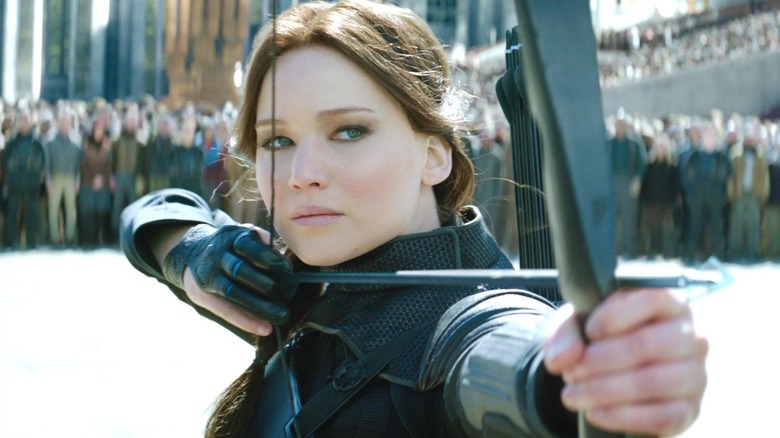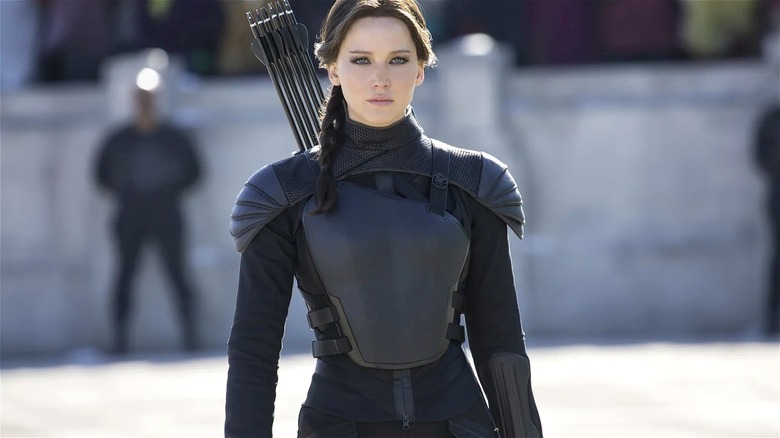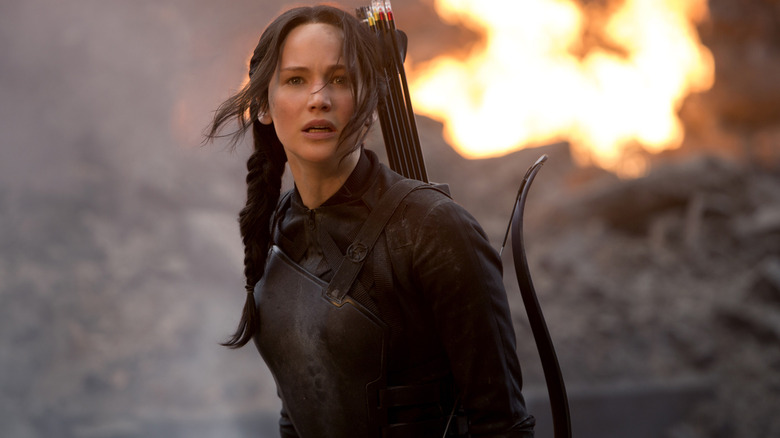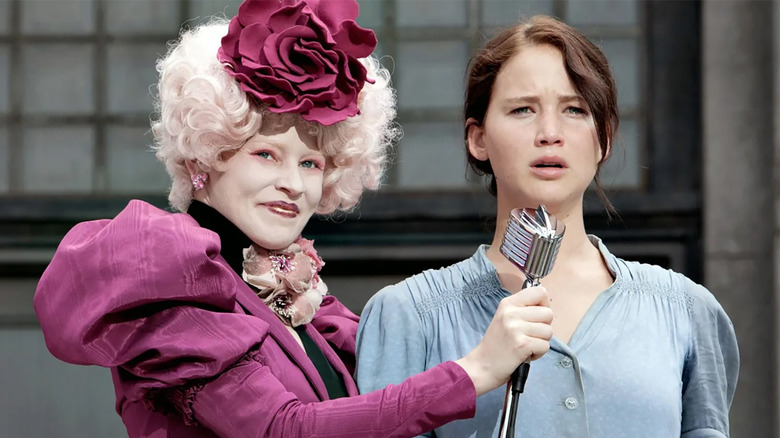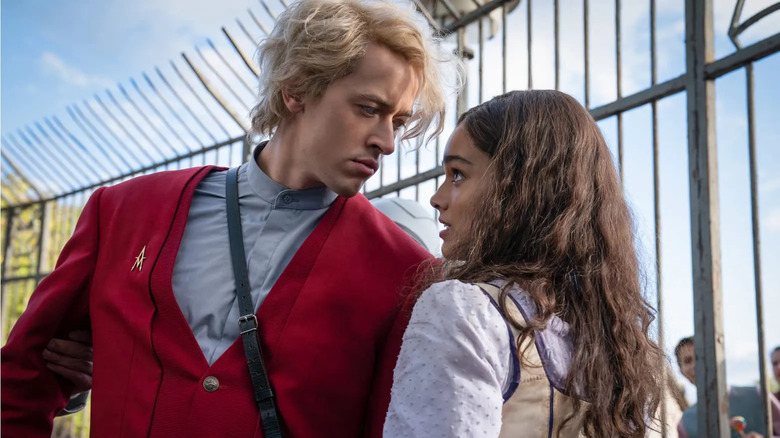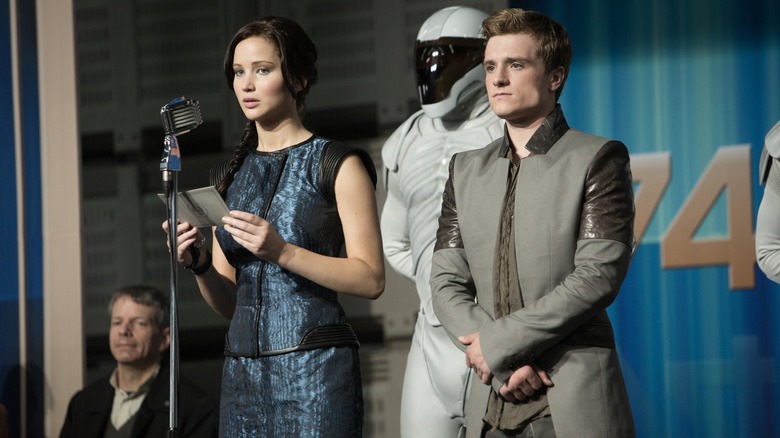Every Hunger Games Movie Ranked
The "Hunger Games" movies are having a moment. Again.
Although many would argue that the original series rode the post-Harry Potter YA wave to blockbuster success, this series has stood the test of time while many of its peers have vanished into the ether for one clear reason: These movies are good. Sometimes extremely good. And their dystopian science fiction world — one that is politically tumultuous and emotionally fraught and deeply interested in the suffering of the innocent and the necessity of revolution in the face of tyranny — feels more relevant now than it did over a decade ago. The newest film, the grim prequel "The Hunger Games: The Ballad of Songbirds and Snakes," feels ripped out of our collective consciousness. These movies were blockbusters when they first arrived. Now, they feel like premonitions ... and life rafts.
/Film "Hunger Games" admirers entered the arena to rank the five movies (as any movie website is wont to do with any movie series), but it proved tricky. No one on the team dislikes any of these films. We all have favorites, sure, but there's not a true dud in the bunch. Even the controversial entries have aged into interesting films worth revisiting. So while this list is ranked, don't think of it as "worst to best." Think of it as "good to pretty darn great."
5. The Hunger Games: Mockingjay Part 2 (2015)
This epic conclusion to the "Hunger Games" saga is often overlooked, partially because the entries that precede the finale are overwhelmingly good, especially in their zestful portrayal of a revolution brewing in the shadows. While "The Hunger Games: Mockingjay Part 2" is not without its flaws, it perfectly captures the unsavory tactics wielded by those in power during civil unrest, often hidden beneath a veneer of measured altruism. While the Capitol is exposed to be as cruelly shrewd as ever — with the aftereffects of Peeta's mind-hijack on heartbreaking display — fresh layers of ruthlessness are unraveled, with pertinent questions about moral allegiances and the notion of "collateral damage" during strife being thrown around for good measure.
Here, Katniss, the young girl who never asked to be the face of the rebellion, is forced to reckon with her Mockingjay status while she deals with personal loss and the bitter truth of innocent casualties that keep piling up during the revolution. After a lengthy, harrowing infiltration of the Capitol that ends in bittersweet victory, and Alma Coin proposing a "symbolic" Hunger Games for the Capitol's children, Katniss makes a decision that forever alters the future of Panem. The raw anticipation surrounding the scene in which she is meant to assassinate President Snow is pure cinematic excellence, and right when she tilts her bow toward Coin, the cycle of tyranny is finally broken, with the Mockingjay's aim being as true as her heart is pure. (Debopriyaa Dutta)
4. Hunger Games Ranking: Mockingjay Part 1
Have blockbusters ever felt as interesting in the years since "Mockingjay Part 1" first released? Yes, much has been made of the logic (or lack thereof) behind splitting author Suzanne Collins' final novel into two movies, proven by the abrupt non-ending of "Part 1." But even with all that said, the extra space freed up by crowbarring an extra movie into the saga suddenly allowed director Francis Lawrence and writers Peter Craig and Danny Strong to focus on making all kinds of fascinating storytelling choices.
The best thing about "Mockingjay Part 1" just might be its ability to point the mirror back towards itself, filling in the gaps with material that contemporaries simply have no time or interest in these days. When was the last time a wartime epic not named "Oppenheimer" truly grappled with its own fascination with death and destruction? By focusing so much of the main plot on throwing Katniss headfirst into District 13's propaganda campaign, all her epic newsreel footage and deceptively triumphant, trailer-ready imagery can't help but suggest sly commentary on how dystopian YA adaptations are marketed to spectacle-hungry audiences. For once, even Katniss' lack of agency feels like a feature rather than a bug, reflecting how franchises can trap movie stars in never-ending cycles.
Does all this make for the best overall movie or the most faithful adaptation of its source material? Maybe, maybe not. But "Mockingjay Part 1" has much more on its mind than the typical blockbuster — and that's worth appreciating. (Jeremy Mathai)
3. The Hunger Games (2011)
Establishing the first movie in a hopeful franchise is no easy feat, especially when that franchise is based on a best-selling book series with millions of fans. Thankfully, director Gary Ross does a spectacular job of setting the table with "The Hunger Games," not unlike the necessary work done by Chris Columbus on "Harry Potter and the Sorcerer's Stone."
First of all, Ross had the spectacular sense to cast Jennifer Lawrence as Katniss Everdeen. Though Lawrence had just received an Oscar nomination and joined the "X-Men: First Class" prequel franchise, it would be "The Hunger Games" that truly turned her into a household name, and Ross saw the potential for her stirring portrayal of the rebellious but vulnerable Katniss. Establishing the roots between Katniss and Peeta Mellark (Josh Hutcherson) and Gale Hawthorne (Liam Hemsworth), not to mention the tyranny of President Snow (Donald Sutherland) and the ludicrously stylish and vapid dystopian world in which the Hunger Games exist, is key in setting up the more intriguing and powerful chapters to come.
While Ross may not have a remarkable visual style, he does a stellar job bringing us into the world of Panem and the suffering districts itching for a rebellion. Since "The Hunger Games" wasn't afforded the higher budgets of its sequels, Ross does a fine job with the resources at his disposal to give us a perfectly satisfying movie that promises more to come, and it tees up director Francis Lawrence to make good on that promise in "Catching Fire." (Ethan Anderton)
2. The Hunger Games: The Ballad of Songbirds and Snakes (2023)
There are few stories trickier to pull off than a prequel, which much engage and thrill an audience who know exactly where everything is going to end up. The horrible and horrifying beauty of "The Hunger Games: The Ballad of Songbirds and Snakes" is that we know its main character is destined to become an unfathomable monster ... and we're invited to stand by watch it happen, unable to do anything about it.
Yes, this film is the origin story of Coriolanus Snow (Tom Blyth), who will become the tyrannical ruler of Panem. But it's also the story of the monsters that lurk in our midst, of how fascism hides beneath a friendly, relatable veneer. We spend so long getting to know Corio that we forget about his trajectory. We forgive his transgressions, his descent. Until we suddenly cannot. Few blockbusters have investigated the thoroughly modern terror of realizing someone you thought you liked is quietly dedicated to hatred, anger, and evil.
Snow is balanced by Lucy Gray, played by Rachel Zegler with the same movie star magnetism that Jennifer Lawrence brought to the original series. Watching these two navigate an earlier Panem, one barely recovered from war and a masterful achievement in production design, feels downright hostile. We know things won't be better for anyone. They'll be even worse 70 years later. And director Francis Lawrence makes every agonizing minute of this movie count, as he squeezes the oxygen, and the hope, from your body. This film hurts, but the pain feels necessary. (Jacob Hall)
1. The Hunger Games: Catching Fire (2013)
The first "Hunger Games" film was a phenomenon, but the second film in the series, "Catching Fire" is both an action film triumph and a brilliant introduction for young audiences to righteous rebellion. Directed by Francis Lawrence — who would take over the series from here on out — "Catching Fire" takes all of the beloved trademarks of the first film and immediately cranks up the stakes. The pacing feels frenetic and dangerous, the actual Hunger Games themselves are more creative, and the supporting cast is stacked with the additions of Philip Seymour Hoffman, Sam Claflin, Jeffrey Wright, Amanda Plummer, and Jena Malone.
The first part of the film shows Katniss and Peeta's victory tour following their win at the games, but their celebrations are devastating as they witness the way the Capitol continues to exert its fascist power throughout the Districts. Just when it seems like they'll at least be able to spend the rest of their days with their heads down, President Snow adds a stipulation for the Quarter Quell and declares that the 75th annual games would reap exclusively from a pool of former victors — forcing the young duo back in. The first film lit the spark for the radicalization of Katniss Everdeen, but "Catching Fire" fulfills its namesake tenfold. The choice to end the film on a cliffhanger was a bold decision, but one that helped solidify the film's place as the best in the series. When you're in the arena, remember who the real enemy is. (BJ Colangelo)
